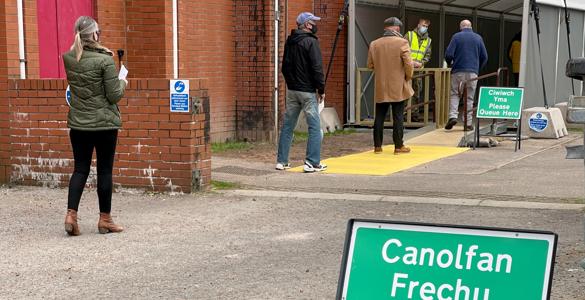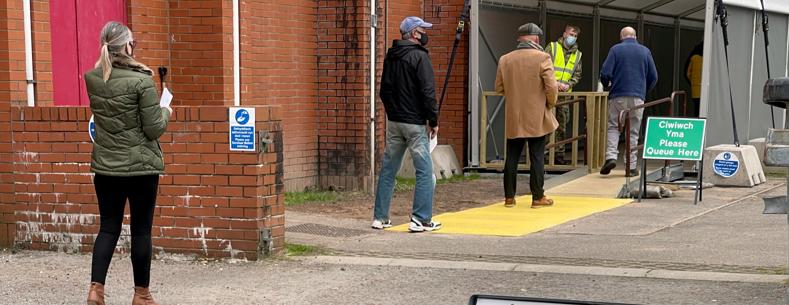Our research article ‘Living with COVID: are we in the endgame’? drew attention to five key issues experts in Wales say we need to keep an eye on as the emergency phase in the pandemic comes to an end. These are the mental health and well-being of children and young people; unpaid carers; vaccination and boosters; the health and social care workforce; and long COVID. This is the second in a series articles that will look at these key issues. This article focuses on vaccination and boosters.
More than 6.8 million doses of COVID-19 vaccinations have been given in Wales
On 8 December 2020, the UK became the first country in the world to administer an approved COVID-19 vaccination; the start of the biggest and fastest vaccination programme ever seen. Welsh Government statistics show that more than 91% of the over-12 population of Wales have been vaccinated with at least one dose of a COVID-19 vaccine, 86% with at least two doses, and 70% with a third dose and/or a booster - a phenomenal achievement.
Vaccination remains a critical part of the Welsh Government’s response to COVID-19. The Welsh Government says in its living alongside COVID plan that vaccination “is the most important thing an individual can do to protect themselves and others”.
On 24 February, Welsh Government published its latest COVID-19 Vaccination Strategy. It sets out how the vaccination programme in Wales will develop in 2022 and beyond.

During the first few months of 2022, the spotlight has been placed on offering vaccination to children and young people.
12 to 17-year-olds and those most at risk because of underlying health conditions are now being offered a booster vaccine.
Younger children aged 5 to 11 -years-old are currently being offered a low-dose COVID vaccine (a two dose course, with an interval of at least 12 weeks between jabs) in vaccination centres (there is no intention to vaccinate in schools).

Many of the oldest and most vulnerable will have received their most recent vaccine dose in September or October 2021. These individuals are at higher risk of severe COVID-19, and with the lapse of time, their immunity derived from vaccination may wane substantially before autumn.
As a precaution to boost protection, adults aged 75 years and over, residents in a care home for older adults and individuals aged 12 years and over who are immunosuppressed are being offered a spring booster (4th dose).

Despite the uncertainties in the year ahead, winter is likely to be the season when the threat from COVID-19 is greatest. The Joint Committee on Vaccination and Immunisation’s (JCVI) advice is that the oldest and most vulnerable people will need further protection and an autumn 2022 programme of vaccinations for those most at risk will be needed.
There is now the expectation that COVID-19 vaccination, as with the flu jab, will become a regular, annual programme.
The Welsh Government has also said it is retaining the need to “stand up surge capacity” (i.e. to accelerate roll out quickly) if there’s a need to respond to a new pandemic wave, or outbreak of a new variant. The government responded to the Omicron variant in this way at the end of 2021.
Key issues for the vaccination programme in 2022
COVID-19 is usually mild in most children, leaving some parents question whether they should get their child vaccinated
In general, most children are not at high risk of becoming severely ill from a COVID-19 infection, so the health benefits of vaccinating them are smaller than in other age-groups. This has left many parents unsure about whether to get their children vaccinated or not.
The rollout for vaccinating 5 to 11-year-olds is “non-urgent”, with an emphasis on parental choice. The JCVI has said going ahead with the vaccine will increase this age group’s protection against severe illness in advance of a potential future wave of COVID-19.
It’s expected that parents will have some concerns about the long-term effects from the COVID-19 vaccines since they are new. But the scientific experts say that all of the evidence show that they are safe and effective for children. The Royal College of Paediatrics and Child Health (RCPCH) has said;
We would encourage all those who are eligible to have the vaccine to consider doing so.
The vaccines being offered have been approved for use by the UK Medicines Healthcare Regulation Agency (MHRA), which means they have had to meet strict standards of safety, quality and effectiveness. The vaccine has already been used widely in other countries.
Vaccines work – the number of hospital admissions is falling faster than the number of new cases but protection wanes over time
Natural immunity arising from prior infection, alongside vaccine-induced immunity will contribute towards protection against future waves of COVID-19 infection and severe illness. There is strong evidence that the COVID-19 vaccines induce a strong immune response but effectiveness wanes over time.
According to estimates from the Office for National Statistics about one in every 14 people in Wales – or 7% of the population currently has COVID-19. It has been estimated that by the end of January 2022, over 85% of children (aged 5 to 11) alone will have had COVID-19, with roughly half of these infections due to the Omicron variant.
When you have had COVID-19, it isn’t certain how long your immunity lasts. So while current immunity levels from both vaccination and infection are high, it’s likely that COVID-19 vaccinations will become an annual event to maintain high levels of immunity and help to protect us against future variants.
There will be another wave of COVID-19
Experts say there will be another wave of COVID-19, though there is uncertainty about the timing and severity of future waves.
It’s difficult to say how effective current vaccines will be against any future variants, and we may see new vaccines licensed and available in 2022.
Certainly it isn’t anticipated that we will see the elimination of COVID-19 from the population. Therefore there will need to be a conversation about balancing the frequency of vaccination and likely vaccine coverage in order to continue to maintain our wall of immunity.
For now, the emphasis seems to be on monitoring new variants and reacting accordingly, such as updating vaccines. But at some point, the focus will surely have to be to minimise infections at a global level.
It is important people make informed choices about the COVID-19 vaccine based on accurate and trusted information. Public Health Wales has patient information and helpful FAQs about the vaccine and safety.
Article by Sarah Hatherley, Senedd Research, Welsh Parliament






